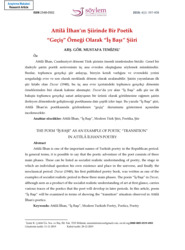Attilâ İlhan’ın Şiirinde Bir Poetik “Geçiş” Örneği Olarak “İş Başı” Şiiri
-
Eser Sahibi
MUSTAFA TEMİZSU
-
Tür
Makale
- Yayın Tarihi 2019
- DOI Numarası 10.29110/soylemdergi.645594
-
Yayıncı
Söylem Filoloji Dergisi
- Dergi Adı Söylem Filoloji Dergisi 4, ( 2 ), pp.397 - 408
- Tek Biçim Adres https://hdl.handle.net/11469/3296
-
Konu Başlıkları
Edebiyat
Anlatıbilim
Attila İlhan
Attilâ İlhan, Cumhuriyet dönemi Türk şiirinin önemli isimlerinden biridir. Genel bir ifadeyle şairin poetik serüveninin üç ana evreden oluştuğunu söylemek mümkündür. Bunlar, toplumcu gerçekçi şiir anlayışı, bireyin kendi varlığını ve evrendeki yerini sorguladığı evre ve son olarak neoklasik dönem olarak sıralanabilir. Şairin yayımlanan ilk şiir kitabı olan Duvar (1948), bu üç ana evre içerisindeki toplumcu gerçekçi dönemin örneklerinden biri olarak kaleme alınmıştır. Duvar’da yer alan “İş Başı” adlı şiir ise ilk bakışta toplumcu gerçekçi sanat anlayışının bir ürünü olarak görülmesine rağmen şairin ilerleyen dönemlerde geliştireceği poetikasına dair çeşitli izler taşır. Bu yazıda “İş Başı” şiiri, Attilâ İlhan’ın poetikasında gözlemlenen “geçiş” durumunu göstermesi açısından incelenecektir.
Attilâ İlhan is one of the important names of Turkish poetry in the Republican period.
In general terms, it is possible to say that the poetic adventure of the poet consists of three
main phases. These can be listed as socialist realistic understanding of poetry, the stage in
which an individual question his own existence and place in the universe, and finally the
neoclassical period. Duvar (1948), his first published poetry book, was written as one of the
examples of socialist realistic period in these three main phases. The poem “İş Başı” in Duvar,
although seen as a product of the socialist realistic understanding of art at first glance, carries
various traces of the poetics that the poet will develop in later periods. In this article, poem
“İş Başı” will be examined in terms of showing the “transition” situation observed in Attilâ
İlhan's poetics.


 Tam Metin
Tam Metin

